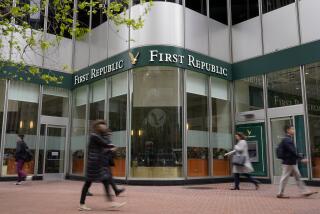The Coldest Winter Twain Spent Was a Summer in S.F.? : Court Attempts to Keep History in Perspective
- Share via
SAN FRANCISCO — Was Mark Twain kidding when he said the coldest winter he ever spent was a summer in San Francisco? Could the legendary guardian of justice, Wyatt Earp, have fixed a boxing match in The City in 1896? Should Jack London be forgiven for stealing oysters and selling them to San Francisco restaurants?
For the Court of Historical Review and Appeals, those aren’t just idle questions. As the self-appointed guardian of San Francisco’s colorful history, the mock court holds frequent “trials” that usually leave spectators in the City Hall courtroom roaring with laughter.
The court recently attacked another sticky question close to San Franciscan hearts--the origin and merits of the San Francisco bagel as compared to the New York bagel.
Opposing counsels Carol Ruth Silver, a San Francisco supervisor, and Lee Dolson, a former supervisor, led their witnesses in a merry dance through the history of the donut-shaped bread, which was called everything from a “Yiddish Cheerio” to a “Begorrah Bun.”
Superior Court Judge Roy Wonder chewed on the evidence and concluded the 38th irreverent proceeding by declaring San Francisco bagels “at least equal to those in New York.”
The court was first convened 11 years ago to draw attention to the opening of a police museum in San Francisco’s Public Library, according to its founder, publicist Bernard Averbuch. He was looking through old police records, Averbuch recalled, when he discovered that Police Chief George W. Wittman had stepped down from his office in 1904 amid accusations of incompetence.
Further investigation suggested that Wittman may have been the victim of bad press. Averbuch approached then-Superior Court Judge Harry Low to hold a hearing to clear Wittman’s name--and publicize the museum opening.
“For political reasons, some people wanted to embarrass him and he was wrongfully fired,” recalled Low, himself an amateur history buff. “It was a blot on history, and I thought we ought to do something about it.”
After an hourlong hearing before a packed courtroom July 9, 1975, Low untarnished Wittman’s reputation. It wasn’t long before he had settled dozens of similar whimsical disputes, ranging from the hot dog’s origin to whether “Fearless Freddie Funston” should be reviled or revered for blowing up a number of buildings to save San Francisco from catastrophic fire after the 1906 earthquake. (Low decided that Funston was a hero.)
Ruling Favors Earp
Despite San Francisco’s reputation as a cold and foggy city, Low ruled that Twain’s complaint about San Francisco weather was “meteorologically false.”
In another decision, Low listened to testimony from a professional boxing referee and the city health director and declared that Earp made the proper call while refereeing a boxing match, despite the bet he had placed on the winning fighter.
And London?
“He was lucky he wasn’t caught. I would have sent him to reform school,” Low said, rejecting defense arguments that the author was 15 at the time of the crime and trying to support his family.
Wit and cleverness count just as much as evidence in these trials. The “spirits” of historical figures on trial often take the stand. Endless puns designed more to amuse than enlighten fly between attorneys and witnesses.
In the recent bagel trial, for example, Dolson attempted to poke holes in the testimony given by Rabbi Herbert Morris of San Francisco by asking if he considered New Yorkers well-bred.
“Well-rounded,” Morris replied, without missing a beat.
“That was a crummy thing to say,” snapped Dolson, much to the audience’s delight.
Trials Every Few Months
Issues for the trials come from a variety of sources--friends, public officials, teachers and books, Averbuch said. When he chooses a question, Averbuch researches the topic, calls witnesses and selects the attorneys--usually public officials. The trials are held every few months or “whenever I feel motivated,” Averbuch said.
“It’s fun,” said Supervisor Louise Renne, who has “litigated” half-a-dozen cases before the court, including one on the fortune cookie’s origin. “It revitalizes San Francisco history, and San Franciscans are very interested in their history.”
More to Read
Sign up for Essential California
The most important California stories and recommendations in your inbox every morning.
You may occasionally receive promotional content from the Los Angeles Times.










